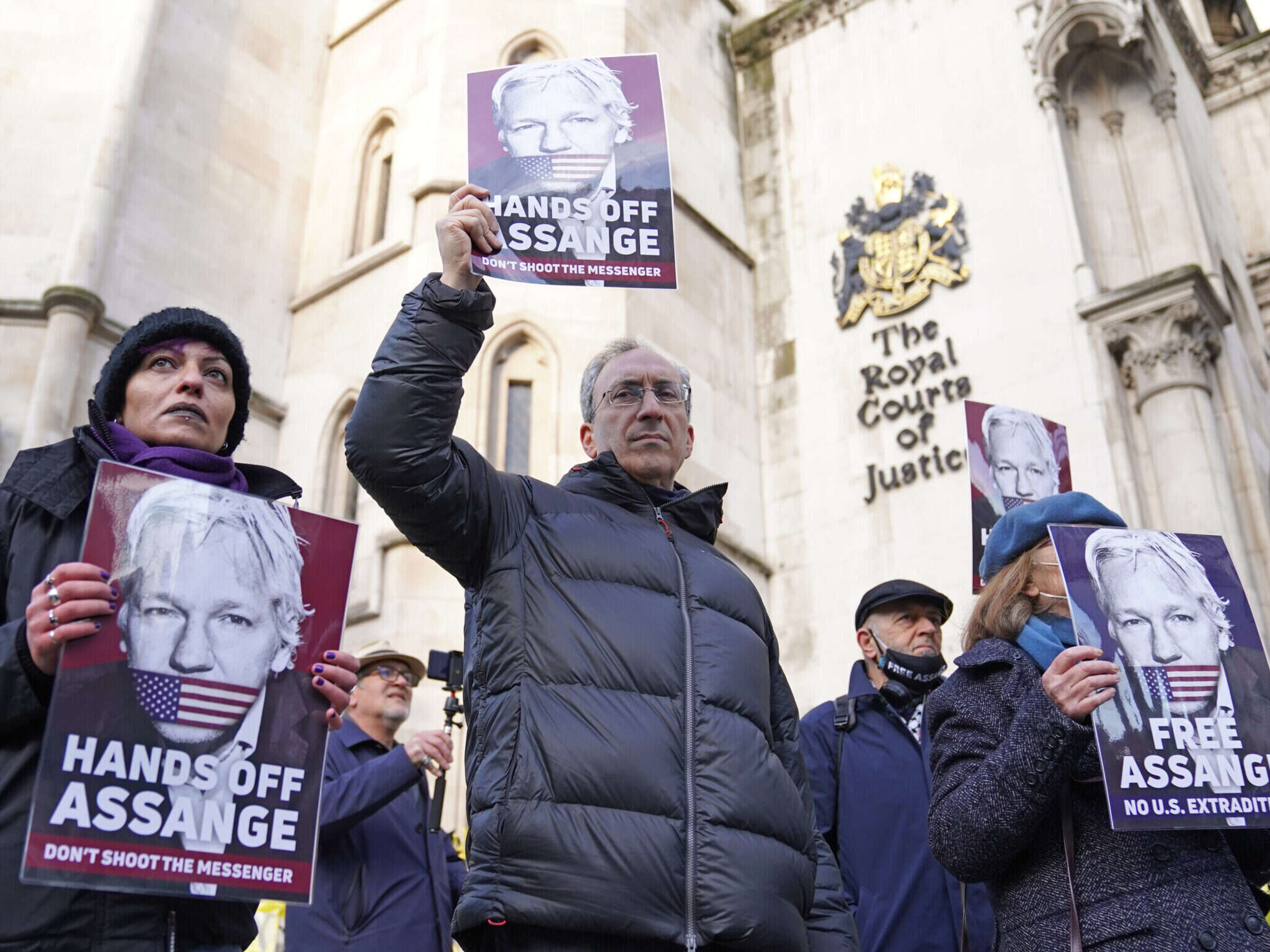
The US Government has won its bid to overturn a judge’s decision not to extradite WikiLeaks founder Julian Assange.
Assange, 50, is wanted in America over an alleged conspiracy to obtain and disclose national defence information following WikiLeaks’s publication of hundreds of thousands of leaked documents relating to the Afghanistan and Iraq wars.
US authorities brought a High Court challenge against a January ruling by then-district judge Vanessa Baraitser that Assange should not be sent to the US, in which she cited a real and “oppressive” risk of suicide.
After a two-day hearing in October, the Lord Chief Justice Lord Burnett, sitting with Lord Justice Holroyde, ruled in favour of the US on Friday.
The senior judges found that the judge had based her decision on the risk of Assange being held in highly restrictive prison conditions if extradited.
However, the US authorities later gave assurances that Assange would not face those strictest measures either pre-trial or post-conviction unless he committed an act in the future that required them.
[Read more: Julian Assange extradition: Freedom of British media to expose US state secrets is at stake]
Lord Burnett said: “That risk is in our judgment excluded by the assurances which are offered. It follows that we are satisfied that, if the assurances had been before the judge, she would have answered the relevant question differently.”
He added: “That conclusion is sufficient to determine this appeal in the USA’s favour.”
Assange’s fiancee Stella Moris said he would appeal the decision “at the earliest possible moment”.
The High Court was previously told that blocking Assange’s removal due to his mental health risks “rewarding fugitives for their flight”.
James Lewis QC, for the US, said the district judge based her decision on Assange’s “intellectual ability to circumvent suicide preventative measures”, which risked becoming a “trump card” for anyone who wanted to oppose their extradition regardless of any resources the other state might have.
Mr Lewis said that the four “binding” diplomatic assurances made were a “solemn matter” and “are not dished out like smarties”.
These included that Assange would not be submitted to special administrative measures (SAMs) and detained at the ADX Florence Supermax jail if extradited and that the US would consent to Assange being transferred to Australia to serve any prison sentence he may be given.
The US authorities also argued Assange is well enough to be extradited, with Mr Lewis telling the court his mental illness “does not even come close” to being severe enough to prevent being sent overseas.
But lawyers representing Assange, who opposed the US’s bid to overturn the extradition block, had argued that the assurances over the WikiLeaks founder’s potential treatment were “meaningless” and “vague”.
Edward Fitzgerald QC said the judge had produced a “carefully considered and fully reasoned judgment”, adding it was “clear” she had “scrupulously applied the test for oppression in cases of mental disorder”.
Mr Fitzgerald later said that assurances not to impose SAMs on Assange or hold him at the ADX Florence Supermax jail pre-trial or post-conviction do not remove the risk of “conditions of administrative isolation”.
The court also heard that Assange had faced a “menacing, threatening and frightening” situation while under surveillance when he lived at the Ecuadorian embassy in London.
Mr Fitzgerald argued in written submissions that claims of “extreme measures of surveillance”, alongside subsequent “recent disclosures about CIA plans from the same period in time to seriously harm Julian Assange”, justified earlier concerns for the safety and privacy of his partner Stella Moris.
Assange has been held in Belmarsh Prison since 2019 after he was carried out of the Ecuadorian embassy by police before being arrested for breaching his bail conditions.
He had entered the building in 2012 to avoid extradition to Sweden to face sex offence allegations, which he has always denied and were eventually dropped.
Reporters Without Borders’ director of international campaigns Rebecca Vincent denounced the ruling, saying it “marks a bleak moment for journalists and journalism around the world… We call on the US government to truly lead by example and close this case now before further damage is done. Julian Assange should be immediately released, and steps taken to ensure no journalist, publisher or source can ever be targeted in this way again”.
NUJ general secretary Michelle Stanistreet said: “For Julian Assange to be extradited to answer charges for cultivating a source and encouraging the revelation of criminality would be a hammer-blow to free expression. Any journalist who thought they might upset a US administration will reasonably fear that they too could be targeted by a judicial snatch squad. When the freedom of our judiciary is under threat, it is disappointing that senior judges should buckle in the face of such unconvincing US blandishments.”
Tim Dawson, chair of the International Federation of Journalists’ Surveillance Working Group, said: “How two of the most senior judges in England could take at face value assurances from the US government is extraordinary. Only a few months ago we learned that the US plotted to kidnap or even assassinate Julian Assange”, according to a Yahoo News story published in September.
Amnesty International media manager Stefan Simanowitz said on Twitter that “If Julian Assange is silenced, others will also be gagged either directly or by the fear of persecution and prosecution”.
Picture: PA Wire/Kirsty O’Connor
Email pged@pressgazette.co.uk to point out mistakes, provide story tips or send in a letter for publication on our "Letters Page" blog
